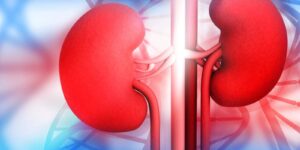What Is Renal Impairment?
Renal impairment, also referred to as kidney impairment or kidney dysfunction, occurs when the kidneys fail to adequately filter waste products and fluids from the blood. This condition ranges from mild loss of kidney function to complete kidney failure. It can develop suddenly (acute) or progressively (chronic), often as a complication of other underlying health issues.
Renal impairment affects millions globally and is a significant risk factor for cardiovascular disease and mortality. Early recognition, lifestyle management, and medical treatment can help prevent its progression.
Types of Renal Impairment
1. Acute Kidney Injury (AKI)
AKI is a sudden loss of kidney function, usually within hours or days. It’s often reversible if diagnosed and treated promptly.
Common causes include:
- Severe dehydration
- Sepsis
- Blood loss or trauma
- Certain medications (e.g., NSAIDs, some antibiotics)
2. Chronic Kidney Disease (CKD)
CKD is a long-term, progressive decline in kidney function. It often results from conditions like diabetes or hypertension.
Stages of CKD:
- Stage 1–2: Mild loss of kidney function
- Stage 3: Moderate impairment
- Stage 4: Severe impairment
- Stage 5: End-stage renal disease (ESRD), requiring dialysis or transplant
Causes of Renal Impairment
Renal impairment can result from a wide range of health issues and external factors. Understanding these causes is crucial for prevention and management.
Major Causes Include:
- Diabetes Mellitus: High blood sugar damages kidney blood vessels
- Hypertension: Uncontrolled high blood pressure strains the kidneys
- Glomerulonephritis: Inflammation of the kidney’s filtering units
- Polycystic Kidney Disease: Genetic disorder causing fluid-filled cysts in the kidneys
- Urinary Tract Obstruction: Blockages such as kidney stones or an enlarged prostate
- Autoimmune Disorders: Conditions like lupus that attack kidney tissue
- Medications: Long-term use of certain drugs can harm kidney function
External Link: National Kidney Foundation – Kidney Disease Causes
Symptoms of Renal Impairment
In early stages, renal impairment may not cause noticeable symptoms. However, as kidney function declines, signs become more apparent.
Common Symptoms:
- Fatigue and weakness
- Swelling in legs, ankles, or around the eyes
- Shortness of breath
- Nausea and vomiting
- Changes in urination (frequency, color, or volume)
- Itchy skin
- Muscle cramps
- High blood pressure
- Metallic taste in the mouth
Diagnosis of Renal Impairment
Accurate diagnosis is essential for managing and treating renal impairment.
Diagnostic Tests Include:
- Blood Tests: To measure serum creatinine and calculate estimated glomerular filtration rate (eGFR)
- Urine Tests: To detect protein, blood, or signs of infection
- Imaging: Ultrasound or CT scan to assess kidney size and detect obstructions
- Kidney Biopsy: In some cases, a sample of kidney tissue is examined under a microscope
Complications of Renal Impairment
If left untreated, renal impairment can lead to several serious health complications:
- Cardiovascular disease
- Anemia
- Bone and mineral disorders
- Fluid retention and swelling
- Electrolyte imbalances (e.g., high potassium)
- Uremia (buildup of waste in the blood)
- Need for dialysis or kidney transplant
Management and Treatment of Renal Impairment
Management depends on the underlying cause, stage, and severity. The primary goals are to treat the underlying disease, prevent complications, and preserve kidney function.
Lifestyle Modifications:
- Follow a kidney-friendly diet (low sodium, potassium, and phosphorus)
- Stay hydrated
- Control blood sugar and blood pressure
- Avoid NSAIDs and nephrotoxic medications
- Exercise regularly but moderately
- Avoid smoking and limit alcohol
Medical Treatments:
- Medications to control blood pressure (ACE inhibitors or ARBs)
- Diuretics to manage fluid buildup
- Erythropoietin for anemia
- Phosphate binders for bone health
- Dialysis for ESRD
- Kidney transplant for eligible patients with complete kidney failure
Nutrition for Renal Impairment
Nutrition plays a key role in managing renal impairment.
Key Dietary Tips:
- Limit sodium to reduce fluid retention and blood pressure
- Manage protein intake to reduce kidney workload
- Choose complex carbohydrates over refined sugars
- Avoid high-phosphorus foods like dairy and cola beverages
- Monitor potassium-rich foods (bananas, oranges, potatoes)
For detailed guidance, visit our Renal Nutrition Guide.
Living with Renal Impairment
Renal impairment is a chronic condition that requires long-term management. With the right support, many people live fulfilling lives.
Tips for Daily Living:
- Keep a symptom journal
- Track your lab results and medications
- Schedule regular follow-ups with a nephrologist
- Join a kidney support group or community
Preventing Renal Impairment
Prevention is always better than cure. Many causes of renal impairment are avoidable with proactive care.
Preventive Strategies:
- Manage chronic conditions like diabetes and hypertension
- Drink adequate water daily
- Get regular health screenings
- Avoid unnecessary medications and herbal supplements
- Protect yourself from urinary tract infections
FAQs About Renal Impairment
Can renal impairment be reversed?
In some cases of acute renal impairment, function can return with prompt treatment. Chronic cases typically require ongoing management.
How is eGFR used in diagnosing kidney disease?
eGFR (estimated Glomerular Filtration Rate) is a key indicator used to measure kidney function and determine the stage of renal impairment.
What should I do if I notice symptoms?
See a healthcare provider immediately for evaluation. Early diagnosis significantly improves outcomes.
Conclusion
Renal impairment is a complex but manageable condition when diagnosed early and treated appropriately. Understanding the symptoms, causes, and available treatments empowers individuals to take control of their kidney health. Through lifestyle changes, medical support, and regular monitoring, many people successfully manage renal impairment and live healthy, active lives.
Explore more on our Kidney Health Resource Center for additional information, tools, and expert tips.

